Carpinteria Valley cannabis approaches a milestone
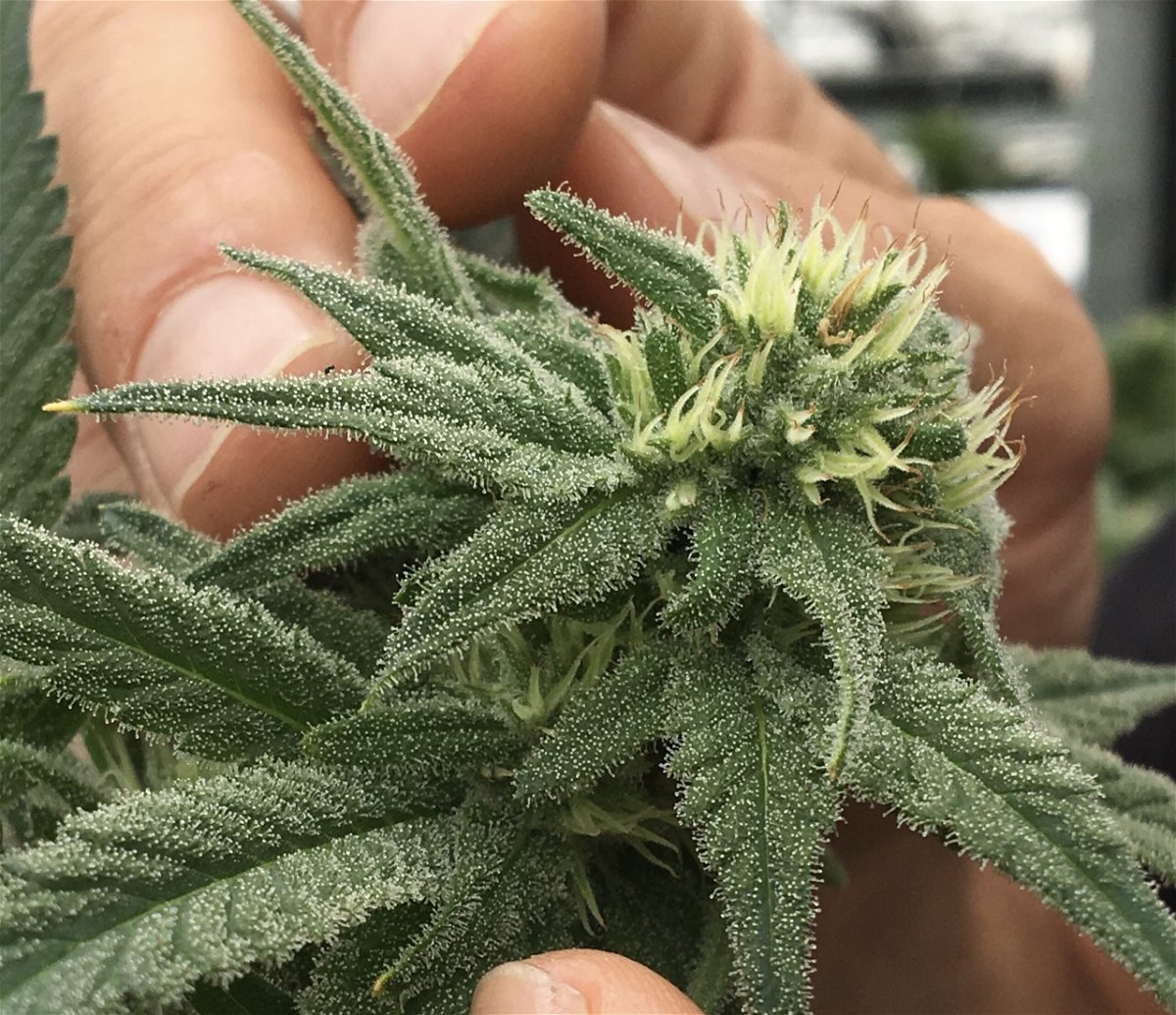
SANTA BARBARA COUNTY, Calif. – This summer, cannabis growers will likely hit the county’s 186-acre cap on zoning permits in the Carpinteria Valley, now the largest greenhouse pot-producing region in California.
It’s a milestone that will trigger two critical deadlines: one of perhaps six months, officials say, for “legal-nonconforming” operators without permit approvals to stop growing cannabis altogether; and another, of perhaps a year, for growers with approvals to obtain a county business license or lose their place under the cap.
That’s good news for the citizens’ groups that have sought to rein in the lucrative and stinky industry that has taken over the valley’s old flower greenhouses since 2015. But the milestone that many residents yearn for is much more elusive — an end to the “skunky” smell of pot that wafts into homes and neighborhoods and travels along with drivers on local roads, a smell that many say brings on headaches, nausea, and breathing problems.
Carpinterians have filed 2,340 odor complaints with the county since mid-2018, including a number this year, but county officials have said all along they can’t address them until all the growers have obtained their zoning permits, the next step after a formal approval. To date, the county has issued permits for only 68 acres of cannabis. And even with all 186 acres permitted, officials say, it will be hard to pinpoint which operator is to blame for an odor because so many greenhouses are clustered closely together.
In the meantime, the county Board of Supervisors continues to churn out a steady stream of approvals for growers, predictably overriding all objections in fulfilling the primary mission it first set out in the cannabis ordinance of 2018: to "develop a robust and economically viable legal cannabis industry." A blistering county Grand Jury report would later find that the board “simply opened the floodgates,” altering the quality of life in this county “perhaps forever.”
“We ended up with a problem that couldn’t be enforced, even if everybody could agree there was an intolerable odor coming through the air,” county Planning Commission Chair Mike Cooney, who represents the valley, observed this month. “I’d say we’re honing in on an odor solution we’re determined to implement. But the process is not moving as quickly as we’d like.
“It’s a lot like fighting the Russian Army. You can take a lot of them down, but there are always more coming.”
‘Accepted practice’
According to the National Cannabis Industry Association, carbon filtration is “the most commonly used and recommended control technology” for reducing odors in cannabis facilities. Such filters have been routinely used for years in cannabis processing buildings where marijuana plants are dried, cured and trimmed, the smelliest stage of cannabis production.
In late 2020, for the first time, Santa Barbara County required filters called carbon “scrubbers” to be installed within a greenhouse cannabis operation in the Carpinteria Valley. The scrubbers have been shown to dramatically reduce the smell of pot before it can escape through the vents on the greenhouse roofs.
As of today, though, only three cannabis greenhouse operations covering 23 acres of cultivation in the valley are equipped with carbon scrubbers. They are Ever-Bloom, at 4701 Foothill Road, a flashpoint in the cannabis “wars” because of its location close to Carpinteria High School; Roadside, a new operation at 3684 Via Real; and CVW Organic Farms, at 1400 Cravens Lane, the first to implement the technology. All three are owned by members of the Van Wingerden family, which rose to prominence in the cut flower industry in the valley in the 1970s and 80s.
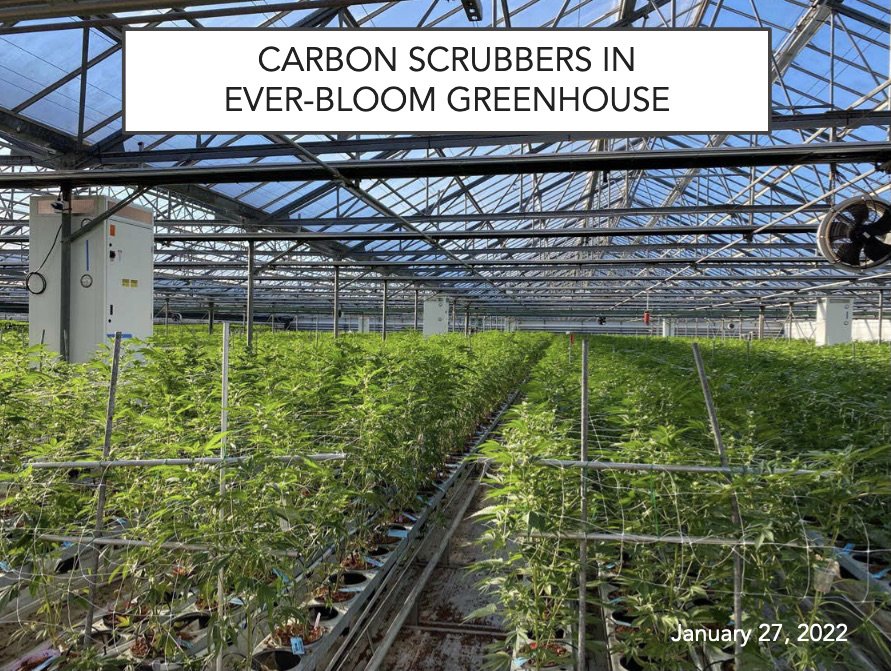
In addition, the county has required scrubbers to be installed within 12 months at four other cannabis “grows,” totaling 21 acres: Maximum Nursery at 4555 Foothill, a Van Wingerden operation next to Ever-Bloom; a Brand family operation at 4532 Foothill close to the high school; Cresco California at 3861 Foothill, operated by Cresco Labs, a Chicago-based corporation; and Creekside Blooms, a Van Wingerden operation at 3508 Via Real.
“We are advising applicants that scrubbers have become the accepted industry practice as a lot of growers have been starting to implement them,” said Lisa Plowman, director of county Planning & Development.
Also, she said, scrubbers conform with an August 2021 agreement between CARP Growers, an industry group that includes most of the valley’s cannabis greenhouse owners, and the Santa Barbara Coalition for Responsible Cannabis, a countywide citizens’ group. The growers pledged to use the “best available control technology” to prevent the smell of pot from drifting beyond their property lines; and in return, the coalition agreed not to oppose their projects.
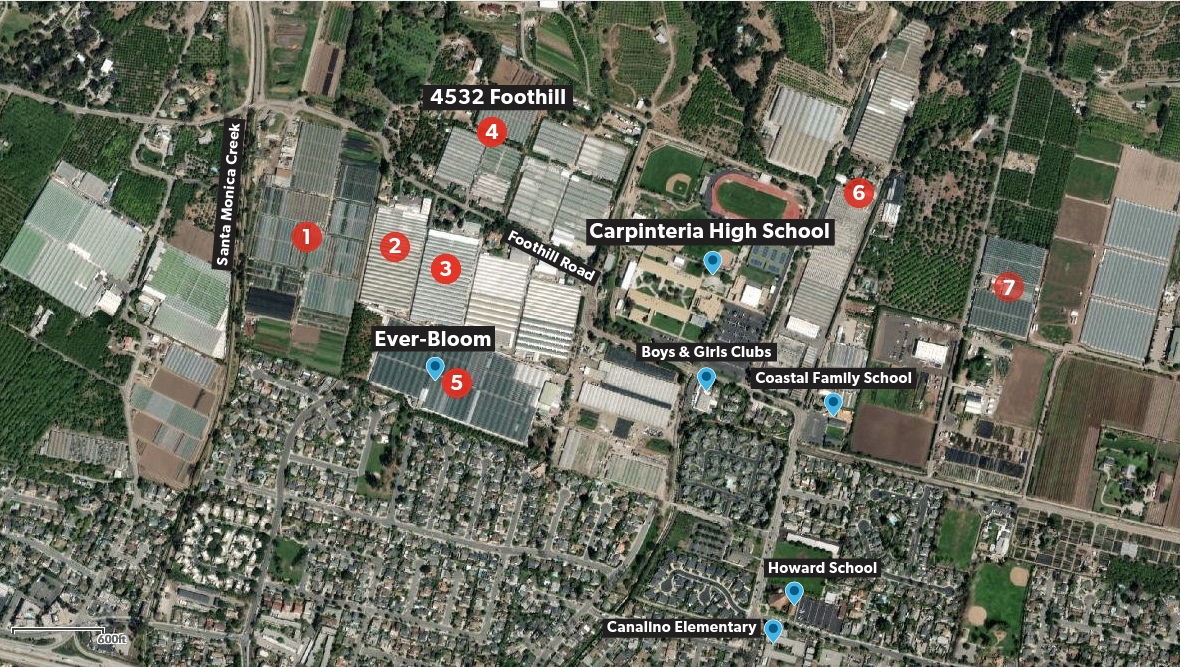
Worst offenders
To date, the county has approved 166 acres of the maximum 186 acres allowed for greenhouse cannabis in the Carpinteria Valley. But even if the 20 acres of cannabis still awaiting approvals are equipped with scrubbers, along with the 44 acres where the technology has been installed or required, that would still leave 122 acres that were approved for permits without scrubbers, or 65 percent of the commercial cannabis allowed under the cap.
Some of the acreage without scrubbers includes the five smelliest greenhouse operations in the valley, at least as defined by the past four years of odor complaints. (The list is an imperfect measure. One “reporting party,” for example, identified only by number, has filed 200 complaints against 5601 Casitas Pass Road in the past 12 months. Another person was turning in bunches of complaints against 3615 Foothill by the week in 2020 and 2021, and each bunch got counted as one complaint. Many residents, discouraged by the lack of any meaningful response, say they have given up filing complaints.)
In first place, with 356 complaints, is Mission Health Associates at 5601 Casitas Pass Road, co-owned by Graham Farrar, one of the top cannabis greenhouse owners and operators in California, and a past president of CARP Growers, and Kyle Kazan. Just up the road, with 276 complaints, is Rincon Point Farms at 5775 Casitas Pass, owned by Thomas Brand and Tadd McKenzie.
In third place, with 252 complaints, is Farrar’s G&K Farms at 3561 Foothill, a greenhouse operation where Farrar hopes to construct a cannabis processing building. Fourth, with 216 complaints, is Ever-Bloom, owned by Ed Van Wingerden, the only grower of the top five to install scrubbers. In fifth place, at 3615 Foothill, with 195 complaints, are Autumn Brands, owned by CARP Growers President Autumn Shelton, and Ocean Hill Farms, owned by Kelly Clenet.
Most of the cannabis greenhouses in the valley are equipped with a first-generation odor control technology, originally developed for landfills, that releases a curtain of mist from perforated pipes around the outside perimeter of the greenhouses or on the roof ridge lines, to neutralize the smell of pot after it escapes into the air. Many residents have objected to smell of the mist, which they compare to that of laundromat detergent.
The CARP Growers agreement does not set deadlines for replacing misting systems with scrubbers, Several member projects now under review, including Farrar’s at 5601 Casitas Pass, don’t include them. That project is set to be heard by the county Planning Commission Aug. 3.
Plowman said the county plans to hire an odor control consultant in July to assess the odor-control systems at cannabis operations, using data from weather monitors and other technologies.
If the growers’ misting systems aren’t working, “They’re going to have to up their game,” Plowman said. “They’re going to have to change their system if it’s not effective.”
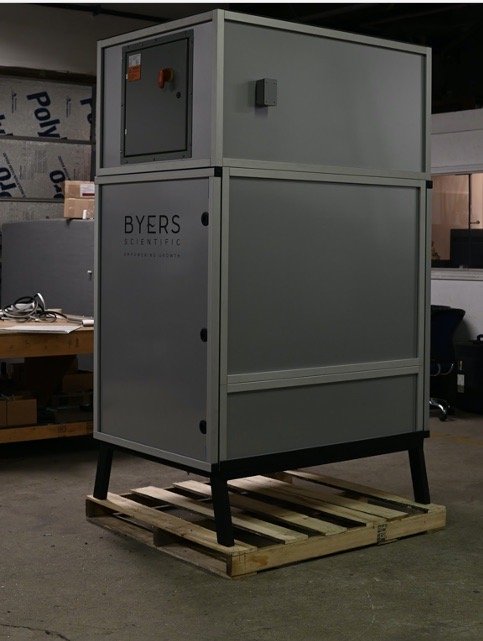
5-0 for Ever-Bloom
On May 24, the Board of Supervisors heard an appeal of the Ever-Bloom project that was filed by Concerned Carpinterians, a group of about 350 residents who have sought stricter regulations for the industry in their midst. Representatives of the group urged the supervisors not to approve the project, scrubbers or no, saying it was too much cannabis, too close to the high school and the United Boys’ and Girls Clubs on Foothill. The health and safety of children was at stake, they said.
When the board was drawing up its cannabis ordinances in 2017, cannabis critics pressed without success for a 1,000-foot buffer, property line to property line, between commercial cannabis and schools and day-care centers. Federal drug laws allow stiffer sentences for the crime of distributing or manufacturing cannabis within 1,000 feet of a school.
Instead, the board decided to require 750- and 600-foot buffer zones, respectively, between schools and the cultivation of mature and “nursery” marijuana plants. And the board said the zones would be measured from the school property lines to the greenhouse “premises,” defining these as the marijuana plants under cultivation.
“I didn’t think the property line was the actual place to measure from,” Supervisor Steve Lavagnino, one of the chief architects of the county’s permissive cannabis ordinance, said on May 24, defending the board’s position. “It doesn’t smell: the plants do. Let’s measure from where the actual odor is coming from. I don’t understand why that was so controversial, and I still don’t.”
The northeastern corner of Ever-Bloom’s property is only 360 feet from the Carpinteria High School property line. As approved 5-0 by the board last month, Ever-Bloom is allowed to grow nursery plants, which do not give off a strong odor, in a portion of the northeastern corner of the greenhouse, outside the 600-foot buffer zone from the school.
In all, 101 scrubbers have been installed throughout the operation, one of the largest in the valley, with 11 acres of cannabis under cultivation. At $20,000 per scrubber, that’s an investment of more than $2 million. The machines are running around the clock.
“It is imperative that we become leaders because of our location with respect to sensitive receptors,” Phil Greene, president of Ever-Bloom, told the board.
Unimpressed, Ann Louise Bardach said Concerned Carpinterians wanted to go on record opposing what she called “the corrosive, corrupting power of the cannabis lobby.” She noted that the majority of students at the high school were Hispanic.
“Would this be happening at Montecito Union School?” she asked, referring to the elementary school in the South Coast’s wealthiest community. “We all know the answer.”
Bardach’s husband, Rob Lesser, read a 2017 letter to the county from the Carpinteria school district in support of a 1,000-foot buffer between schools and cannabis cultivation to protect student health and safety. (In recent years, district officials have not taken a position on cannabis; in 2019, they accepted a $189,000 donation from CARP Growers for a mental health and drug abuse counselor at Carpinteria Middle School.)
Concerned Carpinterians sent a letter to the U.S. Attorney’s office in Los Angeles in 2020 and again this year, requesting an investigation of commercial cannabis growers operating within 1,000 feet of schools in the Carpinteria Valley. The group did not receive a response.
At the May 24 hearing, Ivan Van Wingerden, whose father, Ed, built Ever-Bloom in 1979 and became one of the largest producers of Gerber daisies in the U.S., told the commission that the “last profitable year in flowers” was 2011, a reference to the collapse of the local industry under an onslaught of cheap imports from South America. By 2015, Van Wingerden said, the family had sold several of its properties.
“It was incredibly fortuitous that cannabis came along,” he said.
Ever-Bloom supporters told the board that the smell of pot in the neighborhood was dramatically reduced, compared to three years ago. One speaker said cannabis was “just a crop change”; another called the critics “haters of marijuana” and said they were “over-exaggerating.”
Stephanie Theimer said she lives 500 feet from Ever-Bloom and rarely notices the smell anymore.
“I prefer living by this crop to any other,” she said.
Noting the growers’ yearly donations to local schools, Chris Riley said: “I want to question the motives of the few people who are appealing this. They need to be able to evolve through the times.”
Parting shots
Supervisor Das Williams, who represents the valley, lives there and has accepted past campaign donations from CARP Growers members, called the Concerned Carpinterians appeal “a train wreck” and “an indictment on the Van Wingerdens’ character” and urged critics to “bury the hatchet.”
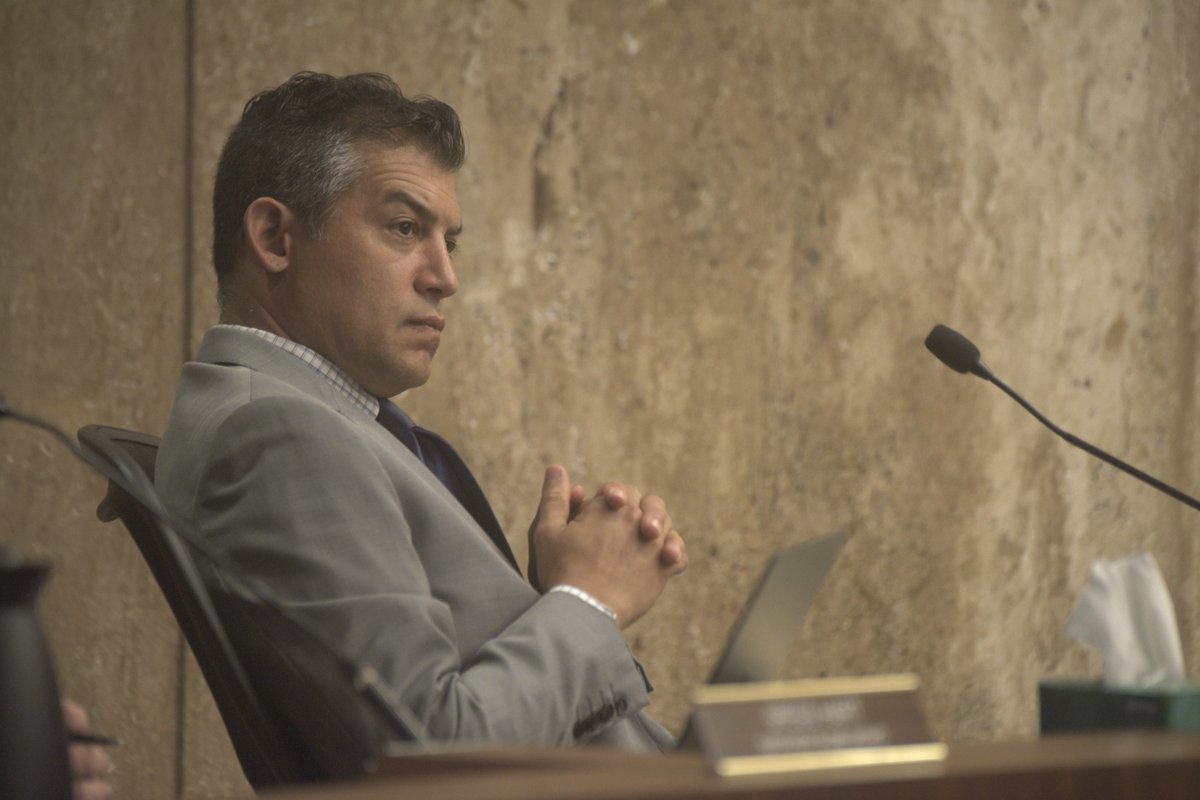
Supervisors Das Williams and Steve Lavagnino were the chief architects of the county's 2018 cannabis ordinance. Photos by Paul Wellman.
“I have seen no one work harder or pour more money into odor control technology in the valley than this family,” Williams said.
Together with Lavagnino, Williams played an outsized role in drafting the 2018 cannabis ordinance, which has allowed medicinal marijuana growers who were growing before 2016 to expand their operations under “legal non-conforming” status, so long as they applied for zoning permits.

Supervisors Das Williams and Steve Lavagnino were the chief architects of the county's 2018 cannabis ordinance. Photos by Paul Wellman.
In requiring scrubbers at Ever-Bloom, Williams said, the county was doing exactly what its critics have been asking for.
“To me, this should be a Kumbaya moment,” he said, “but it doesn’t seem to make anyone happier, at least those who are still in the fight.”
Lavagnino, who represents the Santa Maria Valley, called Ever-Bloom “THE project, the one that’s spending all the money to do it right.”
“It’s depressing,” he said. “It should be a moment where the community comes together. These used to be packed, overflowing rooms with altercations and people calling each other names, and I guess the fact that the place is empty, except for a few folks, is the sunlight in all of this.”
Before the vote, Williams took a final shot at his opponents, noting that the industry was supplying jobs for “a bunch of working people trying to survive.”
“It’s a happy day for my town,” he said, “… and a repudiation of the moral bankruptcy of NIMBYism, which seeks to protect children from a smell when it would deny them a place to live and it would deny them a job.”
Lawsuit on hold
Ever-Bloom is just one of six cannabis “grows” operating on 32 acres near the high school, a day care center and the United Boys & Girls Clubs, not to mention the dense urban neighborhood where Eckstrom lives. None of the other greenhouses in the vicinity are using scrubbers.
In 2020, the coalition; Paul Eckstrom, a resident of Manzanita Street in Carpinteria; and Marllus and Gregory Gandrud, then-residents of Chaparral Drive, sued Ever-Bloom and three other greenhouse operations on Foothill Drive, all owned by members of the Van Wingerden family, alleging that the “ever-present noxious odor” of pot was affecting the plaintiffs’ health and quality of life. The lawsuit is currently on hold.

Eckstrom’s bedroom window is less than 100 feet from Ever-Bloom. In recent weeks, he said, and for the first time in years, he and his wife have been able to open their windows during the day. At night, though, the odor returns.
“The smell has been less here, but you don’t know when it’s going to happen in the evening,” Eckstrom said. “We start watching TV, and then we get hit, and it’s a rush to slam all the windows shut.”
Cooney says he has frequently smelled pot from the greenhouses during four years of coaching baseball at the high school, and he’s not the only one. Here’s an anonymous odor complaint from the county list, dated Feb. 28, 2022:
“As a parent whose two teenage children participated in baseball, softball and soccer, I have personally experienced the strong odor of cannabis during sports competitions, most likely emanating from the growers upwind of the high school baseball and softball diamonds.
“I am concerned that the powers that are in control have allowed such a proliferation of activity that has detrimentally affected the quality of life in Carpinteria without the cannabis grower permittees having implemented clean air technology BEFORE being allowed to start and/or continue said activity.”
Cate weighs in
Cate School, a private high school at 1960 Cate Mesa Road in the foothills of the Santa Ynez Mountains, is the only school and one of only two institutions in the county (the City of Goleta is the other) to file an appeal with the Planning Commission, asking it to deny a cannabis permit that had been previously approved by Plowman, the planning director.
To date, Cate has filed three such appeals. And, in 2019, school officials worked cooperatively with the county to shut down a 0.1-acre Van Wingerden “grow” at 6460 Casitas Pass that was within the 750 feet of the campus.
According to Charlotte Brownlee, an assistant Head of School who lives on campus with 56 other faculty members and 230 student boarders, Cate gets hit with the smell of pot every morning at 7 a.m. The stench of cannabis lingers into morning classes, Brownlee said: “We want the odors to stop.”
On June 1, Brownlee appeared before the commission to oppose plans for a 5.5-acre grow at 4532 Foothill Road, an expansion of 1.6 acres of cannabis under cultivation there now. Eckstrom joined Cate’s appeal on behalf of Concerned Carpinterians.
The project is managed by the Pacific Dutch Group, with Francis Brand as the operations manager. Brand is a third-generation Carpinteria grower and CARP Growers member who has transitioned the family’s business from cut flowers in recent years. At 4532 Foothill, he is using an odor-neutralizing misting system, also called a “vapor-phase” system, on the ridge lines of the greenhouse roofs.
As proposed, more than half an acre of cannabis cultivation, all of it in nursery plants — would lie within the 750-foot buffer zone from the high school, but outside the 600-foot buffer.
“We were about to close our doors for good,” Brand told the commission. “Medical cannabis has allowed my family to continue in business.”
Brownlee asked the commissioners to require scrubbers as part of the zoning permit for 4532 Foothill, and to scale back the operation so that no marijuana would be grown within the 750-foot buffer zone.
The levels of “skunky” odors at Cate “vary in intensity, but they continue to be problematic,” she told the commission. “While we’ve been filing complaints for the last five years, we have yet to see any relief.”
Cate is not located within 750 feet of any current cannabis operation, but Brownlee said she was “advocating for schools.”
“These odors travel,” she said. “They are detectible in our dorm rooms, classrooms and across campus …We firmly believe that no students should be exposed to cannabis odors while they’re trying to learn. If a grow is allowed to operate in the sensitive receptor zone for one school — Carpinteria High School — this could become a precedent for other schools.”
Consultant: “We’re guessing”
Jared Ficker, co-founder of Axiom Advisors, a consultant for Brand and a prominent lobbyist on behalf of the industry during the drafting of the county’s cannabis ordinance, asked the commission for up to six months to gather more data on carbon filtration systems.
“Several carbon filters were tested on this site as part of the CARP Growers effort and found to be less effective than the vapor phase system,” Ficker said, adding that other models were still in the research and development phase. Growers have to determine the right number of machines per acre and the best spots in the greenhouse to put them in, Ficker said.
“We think it’s a good idea not to spend millions of dollars throughout Carpinteria demonstrating the same technology, but instead find a bunch of different technologies, test them and figure out what works best,” he said. “… We’re guessing at what might work at some farms.”
But the commission didn’t like the idea of a long testing period.
“That can go on forever,” Commissioner John Parke, who represents the Santa Ynez Valley, said.
In the end, the commissioners voted 4-1 to allow Brand to grow nursery plants within the 750-foot buffer zone from the high school, so long as he builds a wall separating them from mature marijuana plants. In addition, they said, the greenhouses must be equipped with scrubbers within 12 months.
Chairman Cooney cast the only “no” vote.
“The kids, including my grandchildren, are waiting along with us to see if we can solve the odor problems,” he said. “ … Twelve months seems like a long time to continue ‘bombarding’ the high school and Boys and Girls Club.”
On July 13, the Planning Commission will hear Cate School’s appeal of a project for nine acres of greenhouse cannabis and processing at 5980 Casitas Pass Road. Cate is asking that the grower, Case Van Wingerden, be required to install scrubbers to control the smell of pot.
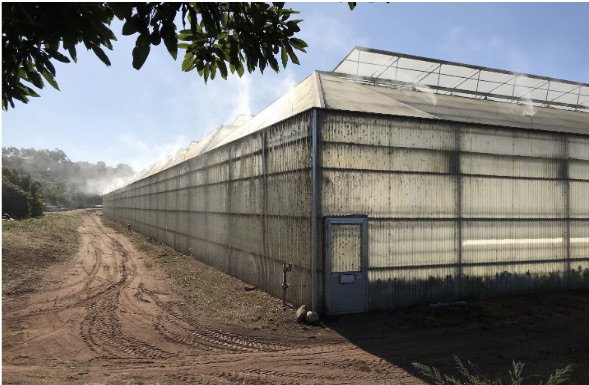
Cate also has appealed Plowman’s approval of Ceres Farm, a 10-acre cannabis greenhouse operation owned by Case and Alex Van Wingerden at 6030 Casitas Pass Road. The project is awaiting a commission hearing date, county officials said.
Melinda Burns is an investigative journalist with 40 years of experience covering immigration, water, science and the environment. As a community service, she offers her report to multiple publications in Santa Barbara County, at the same time, for free.
